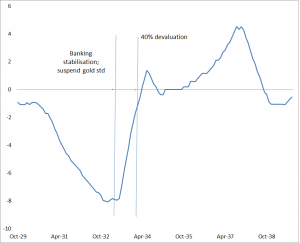Japan’s newfound enthusiasm for macro policy is going to provide a helluva interesting real-life test of the competing notions over whether OECD governments are doing too much or too little to tackle anaemic growth rates.
My guess is that the austerians will have to come up with reasons why Japan’s muscular and highly interventionist policies aren’t sparking hyperinflation, a yen collapse or some other cataclysm.
But from a strictly positive point of view, it will make for an interesting case study. Here we have a government that is basically saying, We’re going to debase our currency. Yet it has too much credibility as a state, a society, to be credible in this threat.
Here’s an example of turning deflation into inflation (US CPI excl food, source: NBER Macrohistory database):
 Most of the time-series from the US macro situation in the 1930s tell me the single most important policy action was devaluing the dollar. Why? Because it shifted people’s expectations, from deflation to inflation, and thereby eased real interest rates.
Most of the time-series from the US macro situation in the 1930s tell me the single most important policy action was devaluing the dollar. Why? Because it shifted people’s expectations, from deflation to inflation, and thereby eased real interest rates. In order to ensure that devaluation, the US had to commit to buy unlimited quantities of the numeraire unit — i.e. gold. In today’s world, Japan would have to commit to buying unlimited US dollars.